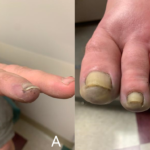Long-term remission & control of CVD risk factors can reduce the risk of atherosclerosis in lupus; triple APL positivity raises the risk of CVD, study finds.


Deborah Levenson |
Long-term remission & control of CVD risk factors can reduce the risk of atherosclerosis in lupus; triple APL positivity raises the risk of CVD, study finds.

Mithu Maheswaranathan, MD |
SLE treatment is rapidly evolving as new therapies are developed & approved. Here are 10 key insights for clinicians.

Yu (Ray) Zuo, MD, MS, & Jason S. Knight, MD, PhD |
Antiphospholipid syndrome (APS) is an acquired thromboinflammatory disease that can have severe, sometimes catastrophic, effects on patients and their families. Our modern understanding of APS began to emerge in the early 1980s. At that point, it was defined as a condition characterized by thrombotic episodes and/or pregnancy complications in the presence of antiphospholipid antibodies (aPL).1…
Hoy et al. sought to evaluate the presence, clinical associations, and potential mechanistic roles of circulating calprotectin in a cohort of patients with primary antiphospholipid syndrome (APS) and those with antiphospholipid antibodies. Calprotectin levels were higher in patients with primary APS and those with antiphospholipid antibodies than in healthy controls. These data suggest that calprotectin has the potential to be a functional biomarker and a new therapeutic target for APS-related thrombocytopenia.

Nedal Darwish, MD, Mohamed Manaa, MD, Griffin Reyes, MD, & James G. Freeman, MD |
Defined by the presence of antiphospholipid antibodies (aPL) in individuals with clinical evidence of thrombosis or pregnancy morbidity, antiphospholipid syndrome (APS) is a systemic autoimmune thrombophilia. Clinical thrombosis, which should be confirmed by objective validated criteria (e.g., imaging studies or histopathology), can occur in the arterial, venous or small vessel vasculature and is not limited…

PHILADELPHIA—Ever since the seminal work of C. Lockard Conley, MD, in 1952 of the discovery of the lupus anticoagulant, antiphospholipid syndrome (APS) has been of great interest to rheumatologists, hematologists and many others. At ACR Convergence 2022, the session titled Draft ACR/EULAR Antiphospholipid Syndrome Classification Criteria sought to summarize the rigorous process that went into…

Although progress has been made in recent years, rheumatologists still have a lot of questions regarding best management practices for antiphospholipid syndrome (APS). During a session of EULAR 2022, Ricard Cervera, MD, PhD, described a holistic approach.

The UNC Rheumatology Fellowship Program: Leah Bettner, MD; Shruti Chandramouli, MD; Christopher Overton, MD; Astia Allenzara, MD; Michael Cunningham, MD; & Luis Palomino, MD |
Neutrophil extracellular traps (NETs) contribute to the pathogenesis of multiple autoimmune diseases. And research has shown that patients with antiphospholipid syndrome (APS) have higher levels of circulating anti-NET antibodies than healthy controls, indicating a potential biomarker.

ACR CONVERGENCE 2021—Hematologic abnormalities are common in systemic lupus erythematosus (SLE), whether due to SLE itself or something else. As rheumatology professionals, we are routinely challenged by the management of cytopenias in our SLE patients. At the ACR’s annual meeting in 2021, two hematologists shared expert advice regarding common hematologic manifestations of SLE. Michael B….
Gendron et al. undertook this study to investigate the prevalence and prognostic value of conventional and nonconventional antiphospholipid antibodies in patients with COVID-19.